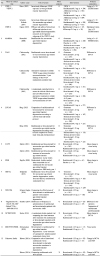Abstract
Purpose
To compare the efficacy and safety of intravitreal injections of bevacizumab, ranibizumab, and aflibercept for the treatment of new patients with age-related macular degeneration (AMD).
Methods
We conducted an update of the most recent and high quality systematic reviews (Canadian Agency for Drug Technology in Health [CADTH] 2016). Three randomized clinical trials were added to 13 trials identified from the CADTH report. The efficacy outcomes were 1) average improvement in visual acuity, 2) proportion of patients who experienced an improvement in vision (an increase in best-corrected visual acuity (BCVA) of ≥ 15 on Early Treatment Diabetic Retinopathy Study [ETDRS] letters), and 3) proportion of patients who experienced worsening of vision (decrease in BCVA of ≥ 15 ETDRS letters). In addition, safety outcomes included systemic adverse events and ocular-related adverse events. To analyze the outcomes of 16 randomized controlled trials, we conducted meta-analyses on the outcome measures.
Results
There was no significant difference in efficacy outcomes among anti-vascular endothelial growth factor (anti-VEGF) drugs. The mean difference in BCVA between ranibizumab and bevacizumab was 0.33 (95% confidence interval [CI]: −1.29, 1.95), and the odds ratio (OR) for a vision gain in the BCVA of ≥ 15 ETDRS letters for the ranibizumab versus aflibercept treatment was 1.02 (95% CI: 0.80, 1.30). There was also no significant difference in safety outcomes, except in terms of arterial thromboembolic events (ranibizumab vs. bevacizumab; OR: 2.15; 95% CI: 1.04, 4.41).
Figures and Tables
Table 4
Results of meta-analysis of anti-vascular endothelial growth factor for age-related macular degeneration

Notes
References
1. Jager RD, Mieler WF, Miller JW. Age-related macular degeneration. N Engl J Med. 2008; 358:2606–2617.

2. Hyman L, Neborsky R. Risk factors for age-related macular degeneration: an update. Curr Opin Ophthalmol. 2002; 13:171–175.

3. Brown MM, Brown GC, Stein JD, et al. Age-related macular degeneration: economic burden and value-based medicine analysis. Can J Ophthalmol. 2005; 40:277–287.

4. La TY, Cho E, Kim EC, et al. Prevalence and risk factors for age-related macular degeneration: Korean National Health and Nutrition Examination Survey 2008-2011. Curr Eye Res. 2014; 39:1232–1239.

5. Stefanini FR, Badaró E, Falabella P, et al. Anti-VEGF for the management of diabetic macular edema. J Immunol Res. 2014; 2014:632307.

6. Cheung GCM, Lai TYY, Gomi F, et al. Anti-VEGF therapy for neovascular AMD and polypoidal choroidal vasculopathy. Asia Pac J Ophthalmol (Phila). 2017; 6:527–534.

7. Mehta H, Tufail A, Daien V, et al. Real-world outcomes in patients with neovascular age-related macular degeneration treated with intravitreal vascular endothelial growth factor inhibitors. Prog Retin Eye Res. 2018; 65:127–146.

8. Campa C, Alivernini G, Bolletta E, et al. Anti-VEGF therapy for retinal vein occlusions. Curr Drug Targets. 2016; 17:328–336.

9. Ashraf M, Souka AAR. Aflibercept in age-related macular degeneration: evaluating its role as a primary therapeutic option. Eye (Lond). 2017; 31:1523–1536.

10. Villegas VM, Aranguren LA, Kovach JL, et al. Current advances in the treatment of neovascular age-related macular degeneration. Expert Opin Drug Deliv. 2017; 14:273–282.

11. Zhang Y, Chioreso C, Schweizer ML, Abràmoff MD. Effects of aflibercept for neovascular age-related macular degeneration: a systematic review and meta-analysis of observational comparative studies. Invest Ophthalmol Vis Sci. 2017; 58:5616–5627.
12. Gemenetzi M, Patel PJ. A systematic review of the treat and extend treatment regimen with anti-VEGF agents for neovascular age-related macular degeneration. Ophthalmol Ther. 2017; 6:79–92.

13. Solomon SD, Lindsley K, Vedula SS, et al. Anti-vascular endothelial growth factor for neovascular age-related macular degeneration. Cochrane Database Syst Rev. 2014; (8):CD005139. DOI: 10.1002/14651858.CD005139.pub3.

14. Sarwar S, Clearfield E, Soliman MK, et al. Aflibercept for neovascular age-related macular degeneration. Cochrane Database Syst Rev. 2016; 2:Cd011346. DOI: 10.1002/14651858.CD011346.pub2.

15. Deonandan R, Jones S. CADTH Rapid Response Reports. Antivascular endothelial growth factor drugs for the treatment of retinal conditions: a review of the safety [Internet]. Ottawa: Canadian Agency for Drugs and Technologies in Health;c2016. cited 2016 May 5. Available from: https://www.cadth.ca/anti-vascular-endothelial-growth-factor-drugs-retinal-conditions.
16. Krebs I, Schmetterer L, Boltz A, et al. A randomised doublemasked trial comparing the visual outcome after treatment with ranibizumab or bevacizumab in patients with neovascular age-related macular degeneration. Br J Ophthalmol. 2013; 97:266–271.





 PDF
PDF ePub
ePub Citation
Citation Print
Print








 XML Download
XML Download